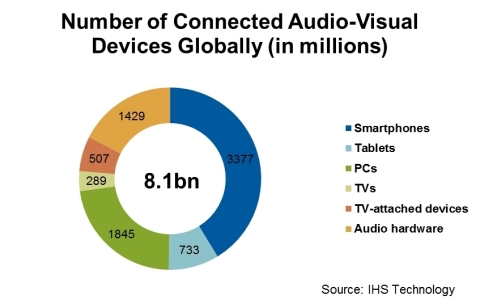Over 8 billion connected devices globally
Friday, June 10th, 2016
Over 8 Billion Connected Devices Globally, IHS Says
- On average, this device base equates to an astounding four devices per household; Netflix has secured a presence across 32 percent of connected devices in the US
LONDON — IHS Inc. (NYSE: IHS), the leading global source of critical information and insight, released key findings from its Connected Device Market Monitor.
The IHS Technology Connected Device Market Monitor report examines key trends and data for global devices, over the top (OTT) and pay TV multiscreen markets.
As of year-end 2015, the world now contains 8.1 billion connected smartphones, tablets, personal computers, TVs, TV-attached devices and audio devices. On average, across the globe, this device base equates to an astounding four devices per household.

“The proliferation of media-enabled connected endpoints has implications for media consumption, media production, broadband infrastructure, and the business itself of network management and traffic discrimination,” said Merrick Kingston, principal analyst-connected home, at IHS Technology. “It drives media consumption, IP traffic and more.”
Smartphones outnumber tablets by five to one
Year-on-year, smartphones contribute roughly half a billion new devices to the market; tablet and OTT set-tops are also growing quickly, but operate a full order of magnitude below the smartphone. By 2020, this ratio will only widen. Within the forecast period, the smartphone-to-tablet ratio rises to nearly 10:1.
Chromecast leapfrogs Apple TV
The latest IHS Technology reports also noted the big changes in the wider-connected, media-enabled hardware ecosystem.
For all its early momentum, Chromecast had been unable to out-ship the Apple TV. This finally changed during the first quarter of 2016 with Apple TV shipping 1.7 million units compared to Google pushing 3.2 million Chromecasts to market. “We anticipate that this reversal will persist,” Kingston said. “Since the introduction of the fourth-generation Apple TV, Apple and Google have pursued vastly different strategies.”
The Apple TV, starting at $149, has inexorably been shuttled into the segment’s top end. The device is now positioned as a premium hub that appeals to consumers of digital video, to casual gamers and to iOS owners who are intrinsically attracted to Apple’s singular user-interface.
Chromecast, at $35, is a veritable bargain, naturally complements portable Android devices and offers a no-frills casting experience that obviates the very need for a user-interface.
Netflix has secured a presence across 32 percent of connected devices in the US
As of year-end 2015, Netflix addresses 339 million connected devices in the U.S. As a fraction of the total U.S. installed base, this is equivalent to addressing 32 percent of the audio-visual hardware landscape.
“Netflix’s reach is a testament to the company’s unrivalled device strategy,” Kingston said. “The service’s ubiquity turns Netflix into a de facto rival – and on occasion complement – to any other given video offering in the U.S.”
The days when a multiscreen pay TV service could uniquely lay claim to a device or platform are effectively gone. Pay TV media apps are virtually guaranteed to sit alongside the Netflix application on consumers’ end devices.
Latest News
- Barb to start reporting TV-set viewing of YouTube channels
- SAT FILM selects multi-DRM from CryptoGuard
- Qvest and ARABSAT to launch OTT streaming platform
- ArabyAds & LG Ad Solutions partner with TVekstra in Turkey
- Freeview NZ satellite TV service to move to Koreasat 6
- Comscore expands YouTube CTV measurement internationally
